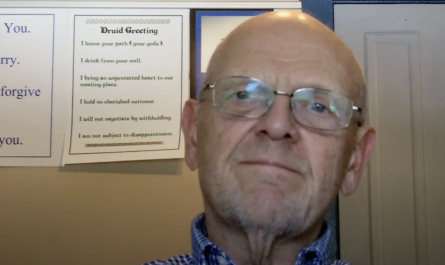 Clutter. I have it in my office. I have it in my shop. I have it in my home (although mostly in my areas, not my wife’s). I can live with all that. What I have a problem with is the clutter in my mind. Constant self-talk, thoughts, judgments, predictions.
Clutter. I have it in my office. I have it in my shop. I have it in my home (although mostly in my areas, not my wife’s). I can live with all that. What I have a problem with is the clutter in my mind. Constant self-talk, thoughts, judgments, predictions.
What does clutter in the mind feel like? To me, it feels like a traffic jam on Times Square, with thoughts and expectations and fears all trying to get through the intersection at the same time. Clearing the mind brings calm and order, a sense of peace, and the ability for me to get where I want to go.
Sleep experts tell us that racing thoughts are common with anxiety disorders such as obsessive compulsive disorder and attention deficit hyperactivity disorder. But we all experience this buzzing clutter at times. The thoughts distract us, unfocus us, and generally contribute to an increasing level of stress.
How can we temper these thoughts, and thus decrease our anxiety?
There are a number of ways to get things out of your head. Here are a few I use:
Ho’oponopono
Ho’oponopono proponents refer to the affirmation as “cleaning,” as in cleaning out one’s mind. Whatever thought, prediction, or fear is troubling you, it can be tempered by cleaning. I’ve experienced this often and find the affirmation extremely productive.
As an example, I had a client who harbored trepidation about initial meetings with high-dominant business owners. Once he got started in a conversation he was fine, but getting off the ground was scary.
Ho’oponopono (I love you. I’m sorry. Please forgive me. Thank you.) cleared his fear as he aimed the “I’m sorry” at his Knower/Judger interpretation that the other person should and would be worthy of his fear. He would utter the affirmation upon entering the target exec’s office, stick out his hand, and introduce himself. After mastering this technique, his ability to greet and connect with perfect prospects has improved dramatically…as has his success.
Meditation
Meditation has been described as a family of self-regulation practices that focus on training attention and awareness in order to bring mental processes under greater voluntary control. It results in improved mental well-being and helps you develop capacities such as calm, clarity, and concentration. What better way to clear the mind than to foster calm, clarity, and concentration?
People from all walks of life—athletes, actors, academicians, musicians, politicians, business pundits—use forms of meditation to maximize the mind’s capacity to support them in achieving their goals and to avoid getting hung up on all the clutter that gets in the way.
I’m not a practiced or regular meditator. But I have used meditation on several key occasions in my life as the method of last resort to get my head cleared of thematic clutter interfering with my personal clarity.
Breathing
A subset of meditation, easy breathing exercises can help oxygenate and calm. They can be quicker and easier to integrate into your day as well. I use breathing frequently. I think it has a lot to do with my mother saying “Just breathe” whenever I was injured or shocked or stunned. I was prone to panic attacks as a young boy, and this technique worked wonders on me. Still does.
Journaling
Just jotting down some of the thoughts racing through your head can relieve your mind of its self-proclaimed duty to address all that “stuff” and is a good tool to use before bed. Writing it down tells the cluttered mind that we’ve already dealt with that issue. In journaling, I like to track what’s going on in the rest of the world (perhaps another person involved in the thought that’s bothering me), what’s going on with me (where am I coming from in this transaction), and how I feel about it. I find that last one both difficult and exposing. Identifying what we feel about things, in my experience, contributes more to calm and clarity than identifying what we need to do about things, so get those feelings down if you decide to journal.
Exercise
Exercise promotes oxygen circulation and endorphin flow, and forces concentration away from the clutter in the mind and onto the activity. I don’t use exercise specifically to clear my mind. I use it as part of my everyday operating system because it is so energizing. I drag myself into a workout before 6:00 a.m. and 90 minutes later bounce out ready to tackle anything, after a great workout, a few minutes in some steam, and a wonderful shower. I suspect if I removed exercise from my routine, my mind clutter would actually increase.
There are many other ways to clear the clutter of our thoughts. What are yours? We all have them, but sometimes we forget to use them. Putting these techniques into action generates a huge payoff. Our mind runs our lives. What we conjure up in that clutter becomes our reality. Leaving it to random chance and outside influence takes away our God-given free will. Why let that happen?



